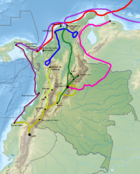Juan de Céspedes Ruiz
Juan (Francisco) de Céspedes | |
|---|---|
| Born | 1501 or 1505 Conquest of the Sutagao Mayor of Bogotá |
| Spouse | Isabel Romero |
| Partner | Isabel (indigenous) |
| Children | unnamed indigenous (son) Antonio de Céspedes Romero (son) Lope Gutiérrez de Céspedes Romero (son) |
| Parents |
|
| Relatives | Diego de Céspedes Ruiz (brother) Hernando de Prado (half brother) María de Céspedes Romero (stepdaughter) |
| Encomendero of Bogotá | |
| In office 1542–1543 | |
| Preceded by | Hernán Venegas Carrillo |
| Succeeded by | Hernán Venegas Carrillo |
| In office 1546–1546 | |
| Preceded by | Gonzalo García Zorro |
| Succeeded by | Juan Tafur |
| Notes | |
Juan (Francisco) de Céspedes Ruiz (1501 or 1505
Knowledge about Juan de Céspedes has been provided by
Biography


Juan de Céspedes was born in 1501 or 1505 in Argamasilla de Calatrava,
When in 1536
New Kingdom of Granada


In 1539, the brother of the founder of Bogotá, Gonzalo Jiménez de Quesada,
In 1543,
Juan de Céspedes had one son with an indigenous woman named Isabel.[1] De Céspedes married Isabel Romero, one of the first Spanish women who arrived at the Spanish colony in northern South America, the widow of soldier Juan Francisco Lorenzo, who drowned in the Opón River. The marriage of De Céspedes and Romero was the first wedding in the New Kingdom of Granada, together with Lope Rioja and Elvira Gutiérrez.[21] The couple had two sons, Antonio and Lope, and De Céspedes one stepdaughter; María, daughter of Isabel Romero and her first husband who was given the last name of Juan.[7][22][23] Lope (Gutiérrez) de Céspedes served as mayor of Bogotá from 1577 to 1578 and in 1605 and Antonio held the same position from 1591 to 1592 and 1596 to 1597.[3]
Juan de Céspedes died in late 1573 or 1576 in the New Kingdom of Granada.[2] The house of De Céspedes was discovered on the site of the first convent of San Águstin, when it was moved to the San Francisco church, the oldest remaining church in Bogotá.[7]
Conquest by Juan de Céspedes
| Name bold is founded |
Department | Date | Year | Notes | Map |
|---|---|---|---|---|---|
| Santa Marta Taganga with Rodrigo de Bastidas |
Magdalena | 29 July | 1525 | [7] | 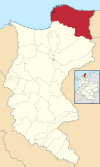 |
| Valledupar | Cesar | 1527-29 | [7] |  | |
| Fusagasugá | Cundinamarca | May | 1537 | [11] | 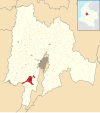 |
| Pasca | Cundinamarca | 15 July | 1537 | [12] |  |
| Tibacuy | Cundinamarca | 1537 | [5] | 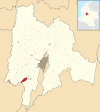 | |
| San Antonio del Tequendama | Cundinamarca | 1539 | [19] | 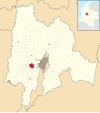 |
Encomiendas
See also
- List of conquistadors in Colombia
- Spanish conquest of the Muisca
- Hernán Pérez de Quesada, Battle of Tocarema
- Panche, Gonzalo Jiménez de Quesada
References
- ^ a b c (in Spanish) Juan Francisco de Céspedes - Geni
- ^ a b c d e Rodríguez Freyle, 1638, p.69
- ^ a b c d (in Spanish) List of mayors of Bogotá - 1538-1599
- ^ Jiménez de Quesada, 1576
- ^ a b Simón, 1626, vol.5
- ^ Fernández de Piedrahita, 1688
- ^ a b c d e f g h (in Spanish) Biography Juan de Céspedes - Banco de la República
- ^ (in Spanish) List of conquistadors led by Gonzalo Jiménez de Quesada Archived 2016-03-09 at the Wayback Machine - Banco de la República
- ^ (in Spanish) Exploración y conquista de Nueva Granada
- ^ (in Spanish) La expedición de Gonzalo Jiménez de Quesada por el Río Magdalena y el origen del Nuevo Reino de Granada (1536-1537) - Jorge Gamboa Mendoza
- ^ a b (in Spanish) Historia de Fusagasugá Archived 2015-05-03 at the Wayback Machine
- ^ a b (in Spanish) Official website Pasca
- ^ (in Spanish) Conquistadores de los Sutagaos
- ^ (in Spanish) Historical summary of Pasca, Cundinamarca
- ^ (in Spanish) Ubaque - "Falda cubierta de bosque"
- ^ (in Spanish) Quetame - Apuntes de historia
- ^ (in Spanish) Hospital in Bogotá
- ^ (in Spanish) A Gonzalo Jiménez de Quesada, creador del "alma" colombiana
- ^ a b (in Spanish) Official website San Antonio del Tequendama[permanent dead link]
- ^ (in Spanish) Atlas histórico de Bogotá colonia - Guía historica y descriptiva de Bogotá colonial - Banco de la República
- ^ (in Spanish) Andrés Mejía disertó en Argamasilla de Calatrava sobre la figura del conquistador Juan de Céspedes y su familia, en su libro "La Provincia de Ciudad Real en el Nuevo Mundo (siglos XVI y XVII)"
- ^ (in Spanish) Genealogy Juan de Céspedes
- ^ (in Spanish) Los caballeros de la conquista
Bibliography
- Fernández de Piedrahita, Lucas. 1688. VI. Historia general de las conquistas del Nuevo Reino de Granada. Accessed 2017-03-06. Archived 2016-11-13 at the Wayback Machine
- Jiménez de Quesada, Gonzalo. 1576. Memoria de los descubridores, que entraron conmigo a descubrir y conquistar el Reino de Granada. Accessed 2017-03-06.
- Rodríguez Freyle, Juan, and Darío Achury Valenzuela. 1979 (1859) (1638). El Carnero - Conquista i descubrimiento del nuevo reino de Granada de las Indias Occidentales del mar oceano, i fundacion de la ciudad de Santa Fe de Bogota, 1-592. Fundacion Biblioteca Ayacuch. Accessed 2017-03-06.
- Simón, Pedro. 1892 (1626). Noticias historiales de las conquistas de Tierra Firme en las Indias occidentales (1882-92) vol.1-5. Accessed 2017-03-06.
Further reading
- Acosta, Joaquín. 1848. Compendio histórico del descubrimiento y colonización de la Nueva Granada en el siglo décimo sexto - Historical overview of discovery and colonization of New Granada in the sixteenth century, 1-460. Beau Press. Accessed 2017-03-01.
- De Castellanos, Juan. 1857 (1589). Elegías de varones ilustres de Indias, 1–567. Accessed 2017-03-01.
- De Plaza, José Antonio. 1810. Memorias para la historia de la Nueva Granada desde su descubrimiento el 20 de julio de 1810, 1-464. Imprenta del Neo-Granadino. Accessed 2017-03-01.
- N, N. 1979 (1889) (1539). Epítome de la conquista del Nuevo Reino de Granada, 81-97. Banco de la República. Accessed 2017-03-01.


